TA 92 cover featured Freedom Mbowe (leader of CHADEMA) speaking at the Tarime by-elections (photo courtesy Mussa Juma http://haki-hakingowi.blogspot.com)
A pdf of the full issue can be downloaded here

TA 92 cover featured Freedom Mbowe (leader of CHADEMA) speaking at the Tarime by-elections (photo courtesy Mussa Juma http://haki-hakingowi.blogspot.com)
A pdf of the full issue can be downloaded here
The Richmond Saga
The Richmond saga continues. On June 23, 2006 Richmond Development Company signed a contract with TANESCO to generate 100 megawatts of electricity when the country was experiencing acute power shortages. Several months later, some legislators said that Richmond lacked experience, expertise and was financially incapacitated (For details see several previous issues of TA) but there had been little progress in bringing to justice the many people involved. The House of Assembly’s Select Committee had produced an impressive report containing 23 recommendations which had resulted in the resignation of the then Prime Minister and Energy Minister. MP’s waited to see what other actions the government would take.
Finally in early August, Prime Minister Pinda announced each of the recommendations in parliament. He said that the Director General of the Prevention of corruption bureau (PCCB), the Permanent Secretaries of the Ministries of Finance and Energy and Minerals and several technical advisers in government and TANESCO plus the members of the government negotiating team had been served with letters to show cause why disciplinary action should not be taken against them for their role in the controversial contract. Continue reading
Several Swahili newspapers reported in October that during elections for leadership positions in CCM’s mass organisations there had been further dissension. The party’s Central Committee and National Executive Committee (NEC) rejected certain prominent candidates. Party members wanted to know why they had disqualified Musoma Rural (MP) Nimrod Mkono for the party’s Parents’ Wing (Wazazi) and a final decision was postponed. For the CCM Women’s Wing a controversial candidate had stated that she wanted to withdraw from the race because of ‘corruption and dirty campaigning’ but was eventually allowed to stand. For the Youth Wing (UVCCM), it was decided that the chairman should come from Zanzibar and that a controversial candidate named Nape Nnauye, who had been expelled earlier as a member allegedly for uttering unproved statements against the party’s senior leaders, should not be allowed to stand. But he remains a National Executive Committee (NEC) member.
CCM’s Secretary General Yusuf Makamba was criticised following the by-election defeat (see below) but no action was taken – Majira.
Government reacts forcefully
Mwana Halisi published a story to the effect that several top CCM officials were plotting to make it difficult for President Kikwete to win the next election in 2010. The Government then asked Mwana Halisi to show reason why steps should not be taken against it over this conspiracy story. In the past the paper had been warned several times about its radical stories according to Majira.
One day after this the State House Director of Communications, Salva Rweyemamu, told the press that the story was a pack of lies aimed at tarnishing the image of Kikwete and his family (his son was mentioned in the story), while instigating hatred among the leadership. He said allegations were a figment of imagination of the newspaper aimed at boosting its sales. Meanwhile, one of the politicians named in the story filed a lawsuit against the editor of the paper, Saed Kubenea, as well as its publishers and printers.
Kubenea said he stood by his story and was prepared to meet the bigwigs in court – Mwananchi.
Mwana Halisi was then banned for three months by the government.
It is virtually unknown for Tanzania’s formidable ruling CCM party to lose a parliamentary by-election but, on October 13 it happened – in Tarime, Mara region. The by-election was caused by the death of the controversial CHADEMA MP Chacha Wangwe who died in a car crash (TA 91). The new MP Charles Mwera (CHADEMA) got 34,545 out of 64,795 votes cast at 406 balloting centers. 2,938 votes were spoilt. At least 149,919 voters had registered for the by-election and were expected to vote. CCM’s candidate got 28,996 and two minor parties got 949 votes and 305 votes respectively.
In a parallel council election CHADEMA also triumphed by 4,820 votes to 3,239.
Voting was peaceful but the campaign was one of the hottest on record. The CCM sent some of its top people to campaign and spent a vast sum of money in trying to regain the seat from the opposition even though CHADEMA has only ten seats in the National Assembly and CCM has most of the remaining 222. There was sporadic violence. The leader of a small party was stoned and injured as he was addressing an election rally, a group of CHADEMA supporters were beaten up.
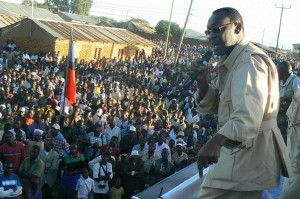
Freedom Mbowe (leader of CHADEMA) speaking at the Tarime by-elections (photo courtesy Mussa Juma http://haki-hakingowi.blogspot.com)
When CHADEMA leader Freeman Mbowe arrived in Tarime to campaign he was greeted by thousands of party members and accompanied by a procession of some 200 motorbikes and cars. Three kilometres from the town he left his car and started marching with the crowd, entering the town in style as people chanted: “commander, commander”. Mbowe was in his signature khaki safari suit. Police said that CHADEMA had ‘declared war’ on them and that the party’s supporters stoned police and smashed their vehicles, as they were dispersing an unlawful assembly – Mwananchi and all other Swahili newspapers.
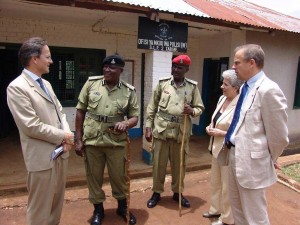
British High Commissioner Philip Parham and ambassadors Staffan Herrstrom (Sweden) and Janeth Siddall (Canada) with the Head of the Police Special Unit, Commander Venance Tossi. The ambassadors visited Tarime during the run up to the by-election and met with the police and the consituency returning officer (photo Mussa Juma)
To finally resolve the controversy as to the precise status of Zanzibar (TA 91) the Attorney Generals of the Union and Zanzibar have announced that, after studying both constitutions, they had decided that the Isles were an integral part of the Tanzanian state, and Zanzibar was therefore not a sovereign state.
In August last year I spent two weeks helping on a project delivering internet connectivity within the Bunda and Serengeti regions of Tanzania. The project, run by a Tanzanian group called ICT for Rural Development (ICT4RD), is identifying the most appropriate and sustainable technical solutions for use in delivering connectivity to rural Tanzania, so as to work out the best technical design as a model to roll out across the country.
The project is partnered with the Dar es Salaam Institute of Technology, The Tanzanian Commission for Science and Technology, and the Swedish International Development Agency.
The project initially links up schools, health centres, hospitals and council offices over 150 km into the Serengeti between Bunda, Natta and Mugumu, providing Internet connectivity and Voice over IP between these locations. The next phase of the project is to attract commercial customers, who are willing to pay for the connectivity thus making it economically sustainable.
The principle behind the technical design of the project is sharing a single satellite internet link between multiple users, therefore sharing the cost and making it more affordable. The cost of a satellite link is the most expensive operational cost in providing internet connectivity to remote areas. For example, Bunda Teaching Training College was paying around $400 a month for its satellite connection, but found this too expensive, and was going to have to shut it down or ask students to fund it out of their pockets. The ICT4RD solution now provides Internet connectivity to the college at a fraction of the cost.
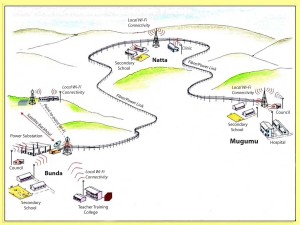
Fig 1 – Internet connection layout for the project area
Figure 1 shows a layout of the project. Continue reading
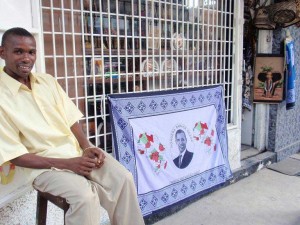
Kanga on sale in Dar-es-Salaam
‘We share America’s excitement in Obama’ wrote the Tanzanian Guardian’s editor, the morning after the historic American election results came out. The paper went on: ‘Americans have spoken – and spoken well. The world is genuinely excited for the United States, whose election has made history by producing a black president, and for the world as a whole….Indeed President-elect Barack Obama’s victory is not only an inspiration to millions of people all over the world but also has special resonance with the people of Africa, where his Kenyan father originated.
Another significant fact is that Americans have taken us through a major lesson in democracy – and this is that, despite the intensity of the contest and the stakes for the contestants, they have come out of it gracefully and truly tested.
One lesson that African politicians must take note of comes from the telephone call made to President-elect Obama by his main rival, Republican Party candidate John McCain. In that call, McCain acknowledged defeat with dignity and went on to concede the historic significance of Obama’s victory to the American people and their country`s politics. “I urge all Americans who supported me to join me in not just congratulating him (Obama) but offering our next president our goodwill, `” McCain stated.
That is how politicians in Africa should conduct themselves if our democracy is to grow to maturity and stabilise the continent……We wish the new US president and the American people well.
IRIN, the humanitarian news and analysis service of the UN Office for the Coordination of Humanitarian Affairs wrote in November about ‘Kitchen parties’ (bridal showers) now becoming popular in Dar es Salaam. Extracts:
Tips for managing domestic arguments and ensuring a happy sex life are just some of the bits of wisdom passed on at kitchen parties. No subject is taboo as the guests prepare brides-to-be for life as a wife….
Scores of elegantly attired female guests attended a recent kitchen party for a 25-year-old banker where the only men were the cameramen and disc-jockey. Gifts, mainly domestic utensils and kitchen equipment, were piled on an elevated platform where the bride-to-be patiently awaited her lesson. A procession of relatives and friends, each with years of marriage experience, took their turns on the microphone.
“If he comes home late, ask the house-girl [domestic worker] to open the door to show him you’re upset,” one elder suggested. “You are the one to wash the bed sheets clean and white,” another guest reminded her.
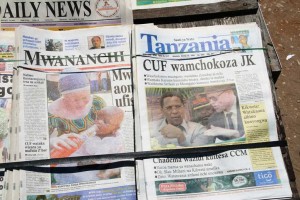
The issue received widespread coverage in the Tanzanian press
Police have said that they have taken to court all people suspected of being involved in the killing of albinos and the subsequent sale of parts of their bodies to be used by witchdoctors. However a Police spokesperson said it was near impossible to control elements bent on perpetrating the killing of albinos “if the communities continue harbouring these murderers and their accomplices.”
Mwanza Regional Police Commander Jamal Rwambow said that 11 albinos – five men, a woman and five children – had been murdered in his region. He added that 28 suspects had been arrested and charged in court.
Six suspects were arraigned in Mara, two in Mbeya and one in Shinyanga.
Tanzania has more than 8,000 registered albinos. Addressing a rally organised by the Tanzania Albino Society, President Kikwete said the government would stand firm in its efforts to ensure the safety of albinos and would not tolerate anyone bent on harming them – Guardian.
More incidents reported
In November however a more sinister development was reported in the Guardian. There were two attempts to catch albino children. In Kibondo District attackers forced a woman to take them to her home, to look for her nine-year-old daughter. The girl was not in the house and so the men attacked the mother. In the second attack, a gang of four men broke into a house at the Lugufu camp in Kigoma, which hosts refugees from the Democratic Republic of Congo, looking for a child with albinism. The child, aged two, escaped kidnap after falling under the bed unnoticed.
Police in south-western Tanzania then arrested a man who was attempting to sell his albino wife to Congolese traders.
The BBC’s Vicky Ntetema in Dar es Salaam said that the attacks appeared to have spread from north-western Tanzania, where they were first reported.
On November 22 the Shinyanga Regional Police Commander was reported to have said that a clandestine albino killing network had been discovered but some traditional healers in Kahama alleged that some members of the police force had taken over TShs 30m/- from them in return for not arresting them. Healers were allegedly being forced to pay between TShs 500,000/- and 1m/- or risk arrest. Bullying was said to be involved as those without money were taken for questioning.
A contribution by Lawrence Cockcroft with the assistance of Gerald Belkin, and Ralph Ibbott.
In responding to a call from the late Julius Nyerere in 1960 to people to work hard and work together on farming in the interest of the country’s development, a small group of the TANU Party Youth League (TYL) led by Ntimbanjayo John Millinga (see obituary below) established, in the Litowa valley in Songea District, what became known later as the Ruvuma Development Association (RDA). Millinga had a vision of developing a village where its families, by working together, would improve their lives and provide a better future for their children.
From this small start in 1961 other groups came for advice and as a result the RDA was formed. All members had agreed that a large part of the work would be carried out communally. In 1966 Griff Cunningham, the Principal of Kivukoni College wrote, “An unique set of circumstances prevailed in the RDA, for the founder and chief sustaining drive behind the settlements is undoubtedly Ntimbanjayo Millinga…(who) has provided a genuinely charismatic leadership from the beginning and has, by his messianic zeal, created a small group of disciples.”
The RDA type villages came to be known as ujamaa villages which soon attracted considerable attention. President Nyerere became very interested. He began to see it as a pattern for the rural development of Tanzania. In the villages and the association there was always much practical discussion, which often led to new enterprises. From past experience, the people knew that if their children went far enough in the school system, they generally went off to work in the big city. This led to them setting up a school at Litowa for the children from all the RDA villages. Millinga’s position had enabled him to select a fine person to be head of this school and to get the authority from Nyerere for them to develop their own curriculum suitable for the needs of the villages.
Discussions also led to the questioning of the law which only allowed the sale of people’s excess maize to the local inefficient co-operative which sold maize flour at more than three times the price at which it purchased the grain. A better price for them would mean earning more development capital. This led to them buying out the Songea grain mill. President Nyerere helped with this purchase by donating Tsh 90,000/- Later the association also purchased the timber mill. Continue reading